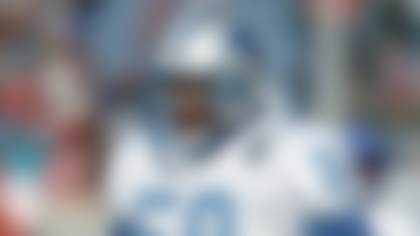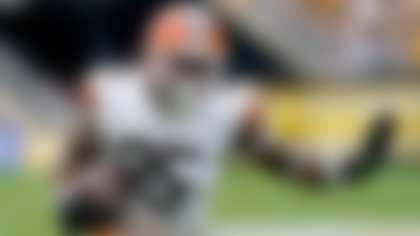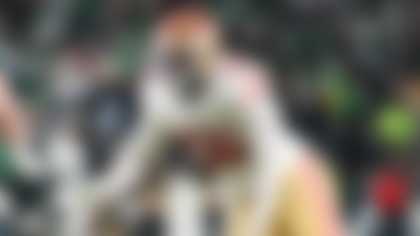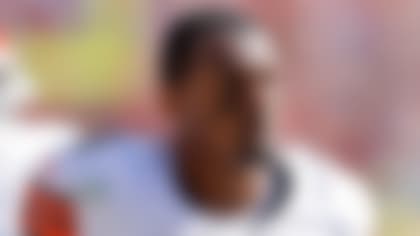The violent hit that left Cincinnati Bengals receiver Jordan Shipley with a concussion was an illegal one, earning Cleveland Browns safety T.J. Ward a $15,000 fine.
To NFL Network analysts Deion Sanders and Steve Mariucci, it wasn't so clear-cut.
The end-zone collision two weeks ago prompted an impassioned debate on "GameDay Highlights" that spilled over into later shows, with Sanders insisting it was a clean hit and Mariucci just as adamant that Ward deserved every cent of the punishment he eventually got.
"His shoulder hit his face," Mariucci said. "A defenseless receiver."
"Where do you want him to hit him? In the stomach?" Sanders shot back.
Football's violent nature is part of its wide appeal. But as more is learned about the long-term damage of head trauma and the NFL puts increased emphasis on preventing concussions, broadcasters have to walk a fine line between savoring good, tough play and glorifying hits that can cause serious harm.
"The truth is the announcers set the tone for what's good sportsmanship and what's bad sportsmanship," said Chris Nowinski, a former pro wrestling star and football player at Harvard who is president of the Sports Legacy Institute, which promotes the study, treatment and prevention of brain trauma in athletes.
"It's not a requirement for their job to understand the concussion problem," Nowinski said. "But the responsibility the announcers have, the reach they have to shape the future of the game, is so big."
Time was a hit that knocked a player out would get rave reviews and few cared whether it was legal or not. Guys who stayed in the game when they couldn't even tell you their names were hailed as warriors.
Yet as evidence has emerged about the catastrophic damage that comes with concussions and other head trauma, prevention and care is becoming a focal point for the NFL. There are new return-to-play guidelines this year, and teams must consult with an independent neurologist whenever there is a head injury. Rules also were changed to prevent "defenseless" players from taking shots above their shoulders.
Cutting big hits out of broadcasts isn't an option. They're part of the game and, unless the league wants to be little more than a flag-football game in the park, always will be, said Joe Theismann, an analyst with the NFL Network, the league's broadcasting arm.
"You have guys running 20 yards at full speed, running into a guy that's either bigger or smaller," Theismann said. "It's the old theory about mass. In this case, when two massive units collide, something's going to give."
Still, while it's hard to quantify, how the big hits are addressed seems to be changing, at least on the pro level.
When Bears backup Todd Collins left a recent game against the New York Giants after being sacked, NBC analyst Cris Collinsworth didn't crack a joke or make light of Chicago losing another quarterback. (Jay Cutler had already been knocked out with a concussion.) Instead, Collinsworth explained that the way Collins was hit and the fact his arms were pinned had made him vulnerable to an injury because he had no chance to break his fall.
Collins was diagnosed with a stinger, and he played Sunday.
"As long as a hit is clean and fair and within the techniques and fundamentals of how the game is to be played, I've got no problem highlighting that or making it a point of emphasis," said ESPN analyst Merril Hoge, whose career was cut short by concussions. "I will never credit or applaud or highlight or emphasize improper techniques or deliberate acts of brutality. And there are some of those that take place."
Even that debate between Sanders and Mariucci was enlightening. While Sanders said he saw nothing wrong with the hit, Mariucci not only said it was illegal, but told viewers why -- when he referred to Shipley as "defenseless."
"One of our big challenges, it's like we have to reintroduce how to play the game. We have to teach it right," Hoge said. "We almost have to reintroduce that to our youth levels. And then, obviously, over time it's going to change. But we're not going to change it overnight."
Case in point: When Philadelphia Eagles quarterback Kevin Kolb went down with a concussion in the first week of the season, someone could be heard making cuckoo noises when the NFL Network highlight was first shown on NFL.com. That same week, an analyst described a linebacker who was staggering off the field as being "on queer street." Neither comment was part of later highlight packages.
"We have always been sensitive and will continue to be sensitive to injuries and player safety," Eric Weinberger, executive producer for NFL Network, said through the league. "We cover all aspects of the games in our news shows, but we do not use illegal hits to promote our sport."
Weinberger declined to answer further questions, including whether the NFL Network edits out comments that could be seen as glorifying hits that could cause a head injury.
Part of the reason networks hire analysts like Sanders, Michael Irvin and Terry Bradshaw is because their colorful personalities ratchet up the entertainment value of a show. Even Colts fans had to laugh when Sanders yelled, "Scobee-Dobee-Doo!" as Jacksonville's Josh Scobee kicked a 59-yard field goal on the final play to beat Indianapolis.
But sometimes comments that might once have been funny can be seen as insensitive.
As the line between a great hit and one that's illegal gets clearer, Nowinski said he hopes comments like that will fade.
"From the health perspective, we need the country to buy in on this," he said. "And the people on the front line are the announcers."
Copyright 2010 by The Associated Press



